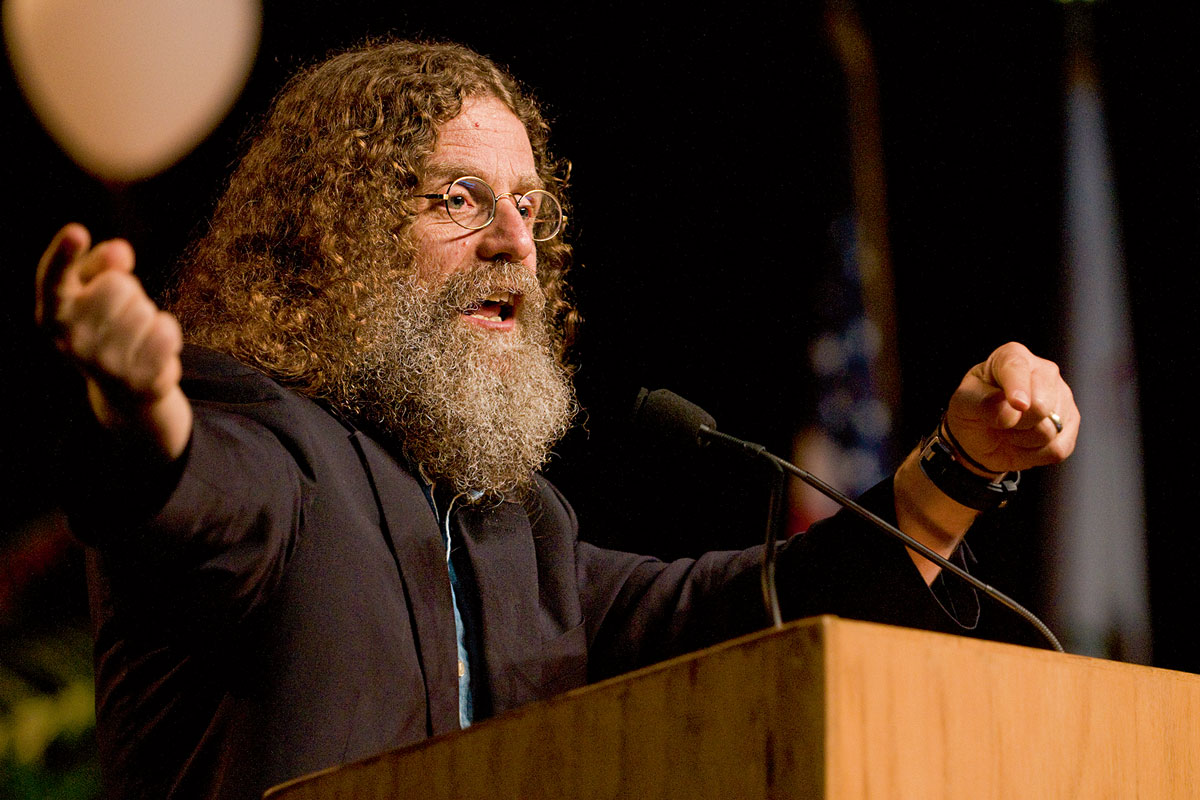Interview with Robert Sapolsky
«Nothing we do is outside the context of our biology»
Professor at Stanford University (USA)

Robert Morris Sapolsky is a professor in several departments at Stanford (Biology, Neurology, and Neurosurgery) and a renowned expert in several fields ranging from neuroendocrinology to baboon behavior and human evolution. His work has received many awards including the MacArthur Fellowship, the US National Science Foundation Presidential Young Investigator Award, the Sagan Prize for Science Popularization, and the Emperor Has No Clothes Award of the International Association for Religious Freedom for openly criticizing religion. He is the author of the must-see film Stress: Portrait of a Killer, countless scientific articles, and many books including Why Zebras Don’t Get Ulcers (1994), The Trouble with Testosterone (1997), A Primate’s Memoir (2002), Monkeyluv (2005), and his most recent and highly acclaimed monograph, Behave: The Biology of Humans at Our Best and Worst (2017).
The Palo Alto bookshop Books Inc. is packed with people waiting to hear him talk, well before Robert Sapolsky arrives with neuropsychologist Lisa Sapolsky, his wife. There is a queue to buy his latest book, filled with people discussing which of his previous books they liked best, and what a captivating speaker he is. As Frans de Waal notes in his review of Behave, few 800-page books can keep our interest from start to finish, but this one does.[1] The book is full of elegantly organized and fascinating facts that are explained in a concise and engaging manner. It starts with the neurology behind a simple movement, and goes all the way to the distant evolutionary origins of our capacity or propensity to make such a movement. And despite his sensible view that genetic, epigenetic, environmental, social and cultural factors all matter, there are enough controversial statements to keep us tuned in the whole time.
Humans and other primates
When I asked Robin Dunbar (see Mètode 67) what he saw as uniquely human, he said «religion». De Waal – surprised with Dunbar’s answer, given ubiquitous animal superstition – picked «greater linguistic complexity» (see Mètode 69). I liked your choice: «readiness to go to war over values and ideologies». It really makes you pause and think like no other answer. It is not a scalar difference, and it captures the best and the worst in us. Sometimes you also mention kindness to strangers, interspecific altruism, adoption, adaptation to the needs of others, and use of symbols, metaphors and abstract concepts. Since these other traits are all documented in great apes, I gather you here have scalar differences in mind, right?
Definitely scalar differences. If I had to summarize what I think is humans’ most interesting bit of uniqueness, I would say our capacity to think and feel about things that are distant over space and time. This makes possible some wonderful things about us: we can help someone on the other side of the planet who we have never seen, try to leave a better planet for our grandchildren, and feel pain for a character in a book or for the person who was butchered a thousand years ago and has now been unearthed as a skeleton. But just as much, it allows some of our worst moments: killing people we have never seen, harming people based on their theology, ideology or even food tastes, and being able to take revenge on someone for acts done decades ago. In other words, a double-edged sword.
Darwin said: «He who understands baboon would do more towards metaphysics than Locke» (Notebook, 1838). Why do you study baboons when you prefer gorillas, when we can also learn so much from gorillas?
My first love, far and away, is the mountain gorilla. I was eight years old when I decided I was going to study them in the field someday, and was still thinking that when studying primatology in college. But reality intervened – for the questions I was asking (the relationships between social behavior and physiology), studying gorillas was out of the question. I needed a species that was not endangered, that lived in open savannas (so you could dart them with anesthetic), that had social groups on the scale of 50-100 individuals instead of a dozen or so. So baboons it was. Not everyone can get to be president, not everyone can get to study gorillas.
Science awareness
What are the main reasons for academics in law and philosophy to read biology? The social determinants of health? Understanding criminal behavior?
Both of those, but more fundamentally, to understand that we are biological organisms, nothing more or less, and that nothing we do is outside the context of our biology. Of note, though, is that biology does not equal genetics. Nor does it equal neurochemistry, or endocrinology, or evolution, or any single disciplinary approach. Instead, the biology of our behavior reflects the interactions of all of those levels of analysis, as well as their interactions with the social world.
People in law and philosophy tend not to read biology because they ignore how relevant and fun reading biology can be, and think we do not need facts when we have hypotheticals: «If there is no free-will, then blah blah…» Some also think biologists have only identified weak tendencies, which do not really change matters much, and they are aware of high rates of non-reproducible results and the tendency for findings to corroborate the experimenter’s theory. Finally, feminists find biology threatening and men find it unflattering. Bearing these reasons in mind, how would you encourage them to read biology?
Yes, probably the single biggest impediment to the criminal justice system actually being informed by twenty-first century neuroscience is the fact that most legal people are the ones who decided in high school that they hated biology. Why should everyone read biology, particularly the biology of behavior? Because consciously or otherwise, we are all behavioral biologists. We are implicitly making biological judgments when we serve on a jury, when we vote for whether the government should spend money to try to solve some social problem, when we decide whether or not to be angry with our teenage child when they do something impulsive. We are behavioral biologists in all those cases, so we might as well be educated ones.

Social justice
Against a fair background of opportunities, some permissible inequalities may emerge from your hard work or your imprudent gambles. But your work suggests that even justified inequalities can impact on differential stress, which may impair memory and judgment, causing some to make bad choices that do not simply express their personal tastes or convictions. For example, stressed men may choose imprudently, and stressed women may miss good opportunities through stress-related excessive risk-aversion.[2] If so, we must be concerned with the size of the inequality, regardless of its origin in variations amongst individuals’ choices. Correct? Or am I exaggerating the relevance of some findings?
I think one absolutely has to do that. I can only address this briefly, or else I will spend 100 pages addressing it: we are accustomed to recognizing that natural athletic skills, being artistic, having perfect pitch in music, having an amazing memory – these are traits that are the outcome of sheer biological luck. It is just as important to recognize that self-discipline, motivation, tenacity, resilience – these are just as much the outcomes of biological luck. Having the capacity to resist temptation is just as biological as having the capacity to remember a lot of numerical digits.
You mention some well-known philosophers, including Rawls, and claim that their judgments depend more on the proximity of lunchtime than on their theories.[3] But surely this depends on the philosopher? It would be false of good philosophers like Rawls. Besides being very moderate, reflective and oblivious to food, his judgments survived decades of reflection and refinement, and constitute a «reflective equilibrium» between particular judgments and more general convictions that became stable and coherent.
Well, I was being a bit tongue-in-cheek there. I was mostly referring to a fascinating study a few years ago which examined the legal decisions made by judges in over a thousand parole board hearings. And remarkably, the single best predictor of whether a judge would grant parole to someone or send them back to jail was how many hours it had been since the judge had eaten. Right after a meal, judges are more benevolent. Right before, the prisoner goes right back to jail. What amazes me about that finding is that you could take one of those judges right after one of those decisions and ask them why they made that decision, and they are not going to tell you about the effects of circulating blood sugar on functioning of the frontal cortex. They are going to say it is because of something that was said by Rawls or Kant or Mill. There are subterranean biological influences shaping us all the time, and we normally do not have a clue that they exist.
Determinism
You seem skeptical of compatibilism. But is not incompatibilism combined with determinism a really dangerous idea? Is not it better for people to believe that people should treat each other as responsible agents? If they are as determined as automata, why respect their views, their wills, and their votes, why believe that they can change?
These questions are pretty much all that I think about these days. It may be a dangerous thing, but it does seem to be how the world works. In terms of the specific worries: if people stopped believing in free will, will that not be a disaster? Will everyone not run amok because «You cannot hold me responsible, because it is all biological; free will is a myth»? Some studies suggest that when you prime people to believe less in free will, their behavior becomes more unethical in economic games, so that certainly is not a good sign. However, I am not too worried that the world would fall apart. This is because there is another group of people out there with a unique view about responsibility: the ones who think there is no omnipotent being to hold them responsible for their transgressions. And an extensive literature of both experimental and naturalistic studies shows that we atheists are at least as ethical in our behavior as theists.
If we are all just biological machines, why care about anyone or anything?
I am not sure why, other than the fact that pain is painful, and it can feel like there is a burning, frantic imperative that transcends what we know about biology to try to lessen someone’s pain.
So how does change occur, if everything is determined?
Here is where the term «biological determinism» introduces a bad, inflammatory distortion, because people often think in terms of some sort of Calvinist predeterminism: everything that will ever be or happen is already set in stone, is fated; except in this case, it is due to biology rather than invoking a god. This is where I think that «determinism» evokes all sorts of incorrect associations. Here is a much better word for it, I think: «caused». Everything that happens is caused by something preceding it, every behavior is caused by something that obeys the rules of biology and the laws of the physical universe. Stated that way, this is uncontroversial and more easily accepted – unless you are willing to invoke magic and choose to live in another century’s mindset, it is not crazy to claim that everything that happens is caused by something beforehand that can only be understood in the context of how the universe works. And framed that way, being a biological «cause» is completely compatible with change. You hear about something wonderful and kind that someone has done, and soon after, feeling inspired by them, you do something kind as well. This change in your behavior was caused: one can trace the neurobiological steps linking finding out about that person’s behavior and changing your own. Without invoking magic.
If we affirm determinism and deterrence as the only guide for punishment, punishments would be as high as they need to be to deter wrongdoing, regardless of proportionality between offense and punishment. Some also argue that we owe some punishment to the criminals, and we owe something to the victims we failed to protect. And who would feel wronged twice, if the distribution of benefits and losses between criminal and victims is not restored to some extent. These are further reasons against relying only on deterrence. You do not find them convincing?
Not at all convincing. If we are truly going to act upon what we know biologically, there is no room for punishment or retribution as virtues in and of themselves, but only as occasional tools of deterrence. Which is so hard to imagine, how society can work that way. But that is the only logical conclusion, given our being biological machines. If a car’s brakes have failed, it cannot be driven: it will hurt someone. If you can fix the brakes, that is great. But if you cannot, the car has to be put in a garage and stay there forever. When you look at human criminality, the model of a car whose broken brakes are beyond car-repair science to fix makes infinitely more sense than models built around medieval nonsense like «souls» or «evil».
Gender
Talking about punishment, you started your lecture by graphically describing your recurrent childhood fantasy about torturing Hitler, and claimed that nothing feels like righteous violence. You also referred to seeing things from another person’s perspective as «the hardest thing to do». The Hitler fantasy is attention-grabbing, signals «I am not holier-than-thou», and sums up the context-dependency dividing right and wrong that you wanted to emphasize. But for me, and at least some other women in the audience, adopting the position of others is the easiest, most enjoyable thing: we meet in cafés to do just that all the time. Having to be Hitler’s torturers would be our worst nightmare. We do not fantasize about it from childhood, and just hearing you describe it made us recoil. Did you expect us to react otherwise?
Not at all. I recoil at the intensity of my feelings when I think about something like that and then try to reconcile it with my being this pacifistic egg-heady professor. Having to actually be Hitler’s torturer would be my worst nightmare as well.
With little intercountry variation, 98% of violent crime is committed by males, and when the crime is both violent and sexual, the percentage is even higher. The 3% female prison population is usually there for prostitution, immigration, and drug offences. And yet the long discussion of violence that followed was again gender-neutral, referring to extreme violence in «teenagers». I wondered if this was an effect of your effort of synthesis, focusing on the amygdala, and aggression as the other side of fear, or if you were tiptoeing around gender-sensitive material to keep your audience on board. Reading Behave,[4] I kept wondering if you downplay gender to make people listen to the things that matter so much to you, like reforming criminal law. Am I wrong?
You are absolutely right. It was mostly an expository convenience: I could either write «So, suppose a terrible crime is committed by someone», or «So, suppose a terrible crime is committed by some guy (while recognizing that while violence is way disproportionately carried out by males, it is not exclusively so, but recognizing at the same time that there are striking qualitative features of gender differences in violence, while also recognizing that while male aggression is obviously correlated with testosterone, the hormone has far less to do with aggression than typically thought, but while also recognizing…)» So on, into the night. So gender neutrality there seemed simpler, after having discussed in the endocrine chapter (Chapter 4) about the sex differences in levels of aggression in humans and other species.

Linda A. Cicero / Stanford News Service
For example, P. J. Zak, a very interesting researcher that you cite in relation to testosterone decreasing trust, says that testosterone decreases generosity and increases the harshness of punishment when the desired concession is not made.[5] It is when testosterone is administered to women that it correlates with increased generosity, because of an increased concern with status. Generous offers are typically associated with typically-female risk aversion. Also, disadvantaged groups make higher offers through fear of rejection. I was surprised you said that testosterone increases generosity in ultimatum games without mentioning gender.[6] Is there another study I am missing?
Yes, that study was with women. But there is another showing that, in the right setting, testosterone enhances pro-social behavior in men.[7]
You also describe testosterone as a neutral amplifier, so that if monks receive high doses of testosterone, they will frantically engage in random acts of kindness. I assume this is a tongue-in-cheek exaggeration designed to make your point, right? High-testosterone priests would make for a dangerous experiment, given testosterone’s other effects, e.g. on sex drive, confidence, risk, and insensitivity. But are you claiming that since testosterone is associated with status maintenance, it can also cause males to compete in pro-social ways, or (less plausibly) that there is no connection whatsoever between testosterone and aggression or sex, even in women?
Yes, completely tongue-in-cheek. It was mostly to make the point that while testosterone certainly facilitates aggression in pursuit of status, people need to appreciate the amount of the earth’s miseries caused by the fact that we reward aggression with status so often.
Turning to a particular variant of killing – honor killing – it seems that though both you and Robert Trivers recognize factors of various kinds, your explanation is mainly cultural, and his is mainly genetic. According to Trivers, forcing daughters to marry a first cousin that is himself the son of first cousins for generations causes patriarchs to be related almost by a factor of 1 (rather than the usual 0.25) to their grandchildren. Exemplary punishments of those who defy this rule allow the selfish gene optimal self-replication. Plus the reputation of extremely-related extended relatives matters too. Do you find this genetic explanation plausible?
Maybe in the more traditional corners of this planet where honor killings occur. But when it comes to honor killings in families transplanted into the West, we are having to make sense of a parent killing their daughter because she wants to go to college, or has gotten a part-time job after school, or listens to popular Western music. That is all about cultures clashing.
Neurons
You find Von Economo neurons’ location in the insula and anterior cingulate «insanely interesting».[8] Could you expand on this, as well as on these neurons’ function? Why are they found only in very large brains?
In terms of function and why only in large brains: no one really knows. I think the location of these neurons is insanely interesting because of the central roles of the insula in moral disgust, and of the anterior cingulate in empathy. How cool is that, that these brain regions contain a type of neuron unique to complex social species?
Those very large brains also typically have many mirror neurons. Is their position uninteresting?
After their discovery, it was irresistible to link mirror neurons with a possible role in empathy. Really charming and fascinating. But the simple reality is that now, a quarter-century after their discovery, very little data actually link them to empathy. But the things they actually are involved in – for example, motoric imitation – are plenty interesting.
I gather from your comments on Behave that there is less evidence for a neuronal explanation of autism than a hormonal one. Correct?
I am going to steer clear from that one, other than to say that it is remarkable how little we understand what autism is about.
[1] de Waal, F., 2017, “A Comprehensive Tome Explores the Biology of Our Behavior”, Science, http://blogs.sciencemag.org/books/2017/06/20/behave/
[2] On how stress impacts men and women differently, see Behave: The Biology of Humans at Our Best and Worst, Penguin Press, 2017, p. 131.
[3] Behave, p. 483.
[4] See e.g. p. 119 or p. 134.
[5] Zak, P. J. et al., 2009, “Testosterone Administration Decreases Generosity in the Ultimatum Game”, PLoS ONE, 4(12): e8330, https://doi.org/10.1371/journal.pone.0008330; cf. Behave, p. 733.
[6] Behave, p. 106.
[7] Wibral M, et al., 2012, “Testosterone Administration Reduces Lying in Men”, PLoS ONE, 7(10): e46774. https://doi.org/10.1371/journal.pone.0046774
[8] Behave, p. 569.





